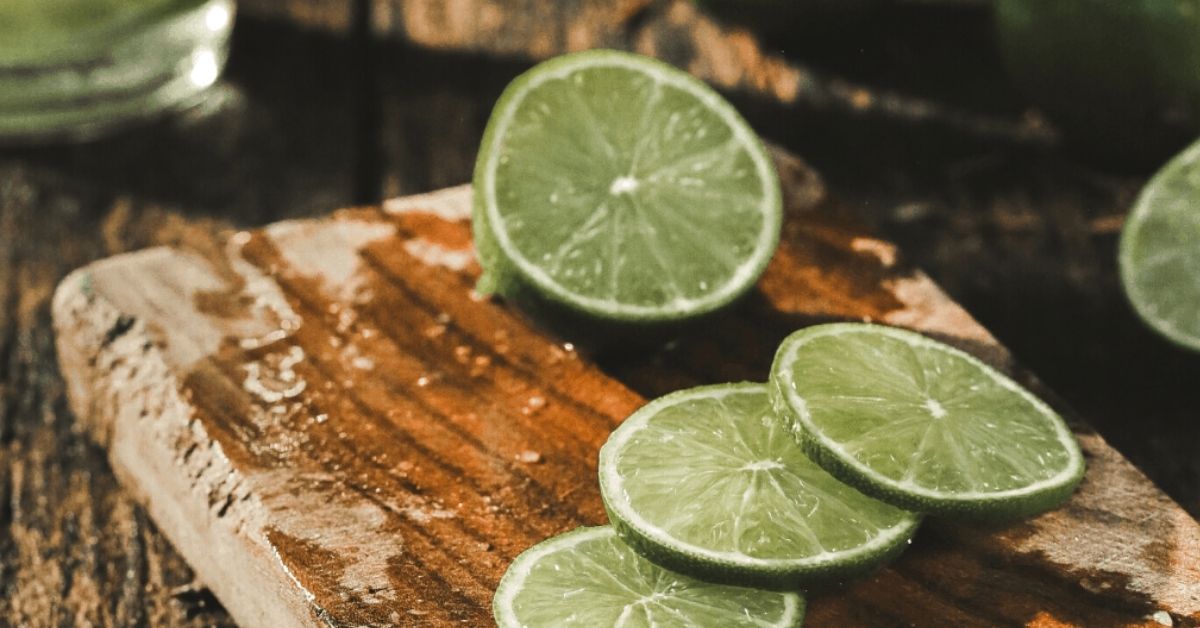Can dogs eat limes is a question I hear every time someone pops open a Corona. So I’m going to cut right to the chase.
Can Dogs Eat Limes?
No, do not feed your dog limes or even give them lime juice!
These particular citrus fruits contain the essential oils limonene and linalool, as well as a phototoxic compound known as psoralens.
While these substances are safe for human consumption, they are toxic to canines.
The limonene, linalool and psoralen compounds are found in the leaves of the citrus trees, as well as the lime peel and the fruit.
A small amount of exposure may not cause a serious threat, but it can cause gastrointestinal upset for your fur baby.
While you are enjoying your margarita or a non-alcoholic cherry limeade, keep your lime in your glass.
You might find it funny to watch them pucker up at the sour taste and want to post a cute video on Facebook, Instagram or YouTube, but don’t do it.
It isn’t funny and could cause health issues for your four-legged friend.

Don’t Miss: Can Dogs Eat Spaghetti Sauce
What About Lemons or Other Citrus Fruits?
Limes and lemons have the same psoralen compound in their peels, so no lemons either.
But apparently, oranges are different and are okay in moderation.
The only caveat for the orange is to watch out for feeding your furry friend too much due to high sugar content.

What Happens If a Dog Eats a Lime?
Lime poisoning in dogs happens when they eat the fruit. Eating citrus can cause kidney and liver failure in dogs, which is often fatal.
The dog’s liver starts breaking down the toxins and can’t keep up with the load, leading to toxic levels of citric acid in their bloodstream which can lead to death.
It depends on how much is eaten. But, exposure to psoralen compound, limonene and linalool could cause diarrhea, vomiting, light sensitivity, and even depression.
These toxins can also cause skin irritation if your furry friend comes in contact with limes.
So if you have a lemon or lime tree in your yard, be sure your dog doesn’t roll around in the leaves or rub against the trunk.
Your best bet is to supervise your pup when playing outside.
Don’t Miss: Can Dogs Eat Hummus?
What Should I Do If My Pup Eats a Lime or Lemon?
If you’re having a party you may have a lot of limes on hand.
Sparky is a counter surfer who decides to run off with a lime, what should you do?
First look for symptoms of poisoning like an elevated heart rate, vomiting, loss of appetite, loss of coordination, excessive drooling and lethargy.
Likely, your dog hasn’t eaten much, but if they are a small breed, a little bit could cause a strong reaction.
If you think the exposure isn’t too much continue regular monitoring and the symptoms should be mild.
But it’s never a bad idea to call your veterinarian for guidance and avoid putting your dog’s health at risk.
You may want to withhold food for 24 hours and keep her drinking water.
If your pup consumed large amount of lime, call or see your vet right away.

What If Only Their Skin or Fur Had Exposure to Lime?
You will need to treat your pup if there has been skin exposure to the toxins in limes or lemons.
The skin can absorb the toxin. This causes skin rashes, so be sure to give them a bath with soap and water after exposure.
How Likely Is It for Dogs to Eat Citrus?
Dogs will most likely not seek out these sour treats. They probably won’t even seek out the sweet treat of the orange, either.
I’ve tried with my baby Reba, a lab mix who eats almost anything and she isn’t a fan of oranges.
Like most dogs, she always wants what I have.
So when I sat down with a delicious clementine, I first made sure it was okay for her to have and then I offered it to her.
She sniffed and walked away. She didn’t even lick and she licks everything!
What About the Health Benefits of Vitamin C?
Yes, vitamin C is essential for your pup.
Your dog can’t have just any source of vitamin C or they’ll end up developing diarrhea instead of getting the benefits of the mineral.
While it is true that dogs can produce their own vitamin C, it is beneficial to make sure they are getting enough.
Here’s why…
- Vitamin C is really good for curbing allergies in your pup as well as gives a boost to his immune system. Vitamin C helps fight toxins, bacteria and viruses.
- Other benefits include providing a vital antioxidant for your dog that helps keep their coat shiny and lustrous. A boost of Vitamin C and Vitamin E maintains your dog’s youthful appearance.
- Vitamin C helps in the production of collagen, a vital tissue that helps in joint and bone health for dogs. Also, enough collagen in the body prevents your dog from developing hip dysplasia, spinal issues or degenerative joint disease.
What Vitamin C Rich Alternatives ARE Ok for My Dog?
- Acerola powder
- Asparagus
- Broccoli, Brussels sprouts, cauliflower, kale (avoid feeding these foods to hypothyroid dogs)
- Camu-camu powder
- Green pepper
- Kiwi
- Mango
- Oranges (beware of amounts due to possible stomach upset)
- Papaya
- Parsley
- Peas
- Pineapple (limit amounts due to possible stomach upset)
- Red pepper
- Sweet Potatoes
Wrapping It pUp
You might see your friends post videos of people feeding dogs a slice of lime thinking they are being funny.
Speak up for your four-legged friend and give them the facts.
Limes should not be fed to dogs for any reason.
Their “joke” will eventually cost them in vet bills.








